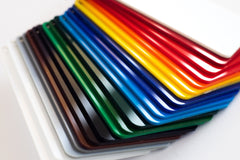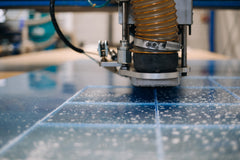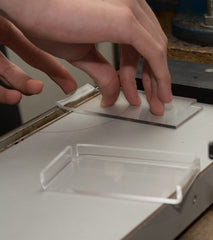Acrylic, often known by brand names like Plaskolite®, Acrylite®, Perspex®, Plexiglas®, Chemcast® or Lucite®, is a transparent thermoplastic often used as a lightweight or shatter-resistant alternative to glass. Its chemical name is Poly(methyl methacrylate) or PMMA.
Known for its excellent clarity, durability, and versatility. Acrylic sheets are commonly used in a wide range of applications such as signage, displays, skylights, windows, and fabricated into unlimited displays, holders, stands and even furniture.
Commonly available in either extruded or cast sheets, acrylic is offered in clear, frosted and colors that are opaque, translucent and transparent.


Fabricating acrylic involves various processes like cutting, routing, machining, and thermoforming. Proper methods easily result in a quality product and done safety.
Be sure to consult the GoIndustrial Acrylic Fabrication Guide for technical details and safe work processes for working with Acrylic in your own shop.
Acrylic can be worked on standard woodworking equipment, with minor modifications and adjustments. Tools like circular saws, table saws, band saws, hand routers or drill-press.

Each method requires specific considerations regarding blade type feed speeds and fixturing guidelines to minimize the risk of chipping, fracturing or melting the material. Machining acrylic also involves techniques like turning, drilling, and tapping, which require sharp tools and appropriate settings to achieve clean cuts and holes.
Acrylic can achieve exceptional edge finishes, using various techniques such as sanding, buffing, and flame polishing are used to enhance the appearance of acrylic products.
Cementing or gluing is another critical aspect of fabrication that involves joining acrylic sheets using solvent cements or polymerizable cements for a strong bond.
Overall, working with acrylic requires understanding its properties and following recommended practices to achieve the desired results while maintaining safety standards.
Acrylic offers numerous benefits that make it a popular material choice across various industries. Its primary advantage is its clarity, which is comparable to glass, yet it is much more impact-resistant, making it an ideal material for safety and security applications. Acrylic is also lightweight, which reduces shipping costs and makes it easier to handle and install.
Another significant benefit of acrylic is its versatility. It can be easily cut, shaped, and formed into complex designs, allowing for creative freedom in projects like signage, displays, and architectural features. Additionally, acrylic has excellent weather resistance, maintaining its clarity and structural integrity even when exposed to sunlight and extreme temperatures.
Acrylic's durability extends to its chemical resistance, which makes it suitable for use in laboratories and industrial settings where it may come into contact with corrosive substances. Furthermore, acrylic sheets are available in a wide range of colors and finishes, providing options to match aesthetic preferences or functional requirements.
Overall, the benefits of acrylic include its optical clarity, impact resistance, lightweight nature, versatility in fabrication, UV, weather and chemical resistance, and ultimately its aesthetic flexibility.

Should I DIY my project or work with an Industrial Plastics Acrylic Fabricator?
Deciding whether to fabricate acrylic yourself or to use a professional plastics fabricator depends on several factors including the complexity of the project, the precision required, and your own expertise and equipment. For those with woodworking skills, simple fabrication like cutting a sheet to size or drilling holes, is a straightforward project. If you have more advanced skills, routing corners and edges, and gluing or bonding should be within your capabilities with a little practice. However, for more complex tasks requiring specialized equipment or when high precision is needed, a professional fabricator is recommended.
Professional plastics fabricators have access to and training on advanced equipment like CNC routers and laser cutters, which can produce precise cuts and intricate shapes that might be difficult to achieve with basic tools. They also have experience with specialized techniques such as line bending, bonding, and finishing, ensuring a high-quality result.
Safety is another consideration. Fabricating acrylic does involve the use of power-tools and shop equipment which can present hazards in materials and processes; professionals are trained to handle these safely and have the necessary safety equipment. We encourage and support our customers in attempting fabrication projects, but we always caution to know your limits, recognize your safety training and work within your personal limits.
If you're working on a large-scale project or producing multiple copies of an item, or have ongoing production requirements, then a professional fabricator can also offer efficiency and consistency while allowing you to do work in your area of specialization. They can often complete the job faster and with less waste than an individual working alone.
About Industrial Plastics & Paints
Industrial Plastics & Paints is Your Project Store for Acrylic & Plastics Fabrication. Every location has a full plastic fabrication shop capable of cutting, forming, bending, gluing, drilling or routing acrylic. We offer precision CNC Laser, CNC Routing and Machining services to your detailed prints, as well.
If you are interested in purchasing acrylic sheets for your own fabrication project, visit our Acrylic Products page.
If you would like to request a custom fabrication quote from our team of professional in-store fabricators, visit our fabrication services page.
Our Custom Acrylic Fabrication Services include:
| Menu Holder | Brochure Holders | Document Protectors | Raffle Boxes |
| Chocolate Display Stands | Boat Windows | Motorcycle Fairings | Bulk Bins |
| Windshields | Hatches & Covers | Viewing Windows | Document Holders |
| Collectable Displays | Aircon Vent Inserts | Point of Purchase Display | Signboards |
| Museum Cases | Cake Displays | Candy Shelves | Letters |
| Pastry Displays | Clipboards | Merchandise Display | Podiums |
| Machine Guards | Fire Extinguisher Covers | LED Signage | Sink Backsplash |
| Door kick-plates | Light Lenses | Fluorescent Lenses | Drawer Inserts |
| Wedding Signage | Table Features | Art Glazing | Aquariums |
We also apply hardware, stand-offs, hinges, handles, stickers, labels, vinyl decals or silk screening for added personalization and branding.
Key Brands
Full sheets, cut to size and custom fabricated acrylic sheet (Brands such Plaskolite®, Acrylite®, Perspex®, Plexiglas®, Chemcast® or Lucite®) with either Extruded or Cast Acrylic in clear, frosted, textured, opaque and translucent colours. We also supply stock shapes of acrylic sheet, acrylic rod and acrylic tube.
Markets Served
With Seven (7) locations in Western Canada we support Vancouver Island, Coastal BC, Metro Vancouver, Fraser Valley, Okanagan, as well as Alberta, Saskatchewan and the rest of Canada. Our stores are located in Victoria, Nanaimo, Courtenay, Richmond, Mission, Kelowna, and Calgary.
Local Delivery & Shipping
If you're near a store we can offer you local delivery and if you need it shipped to the location of your choice, let us arrange a carrier and take care of delivery to get you the right products at the right price, at the right time.

